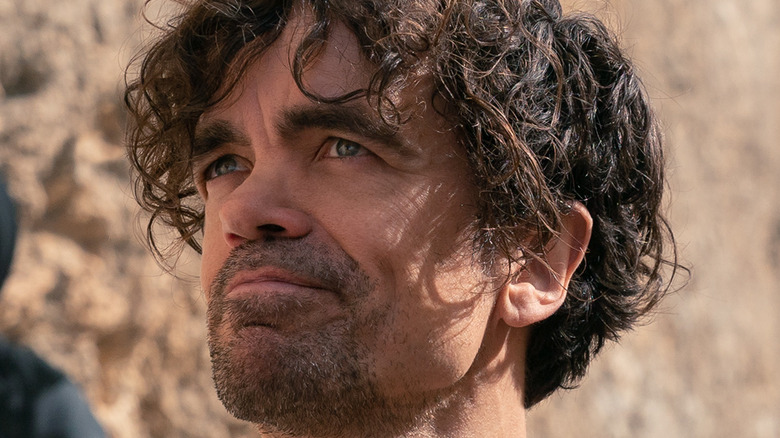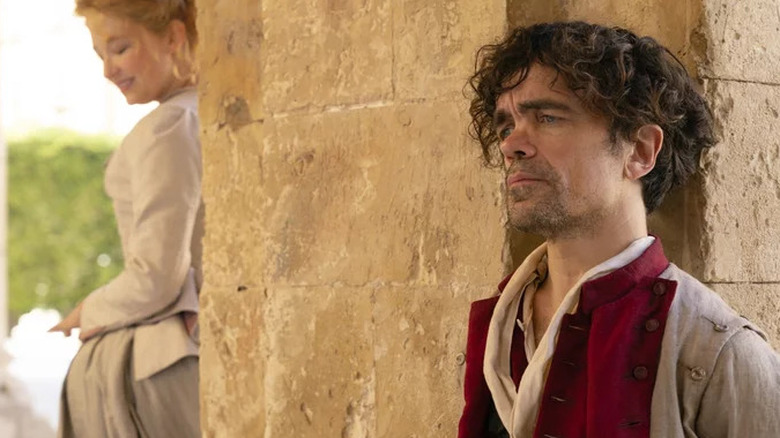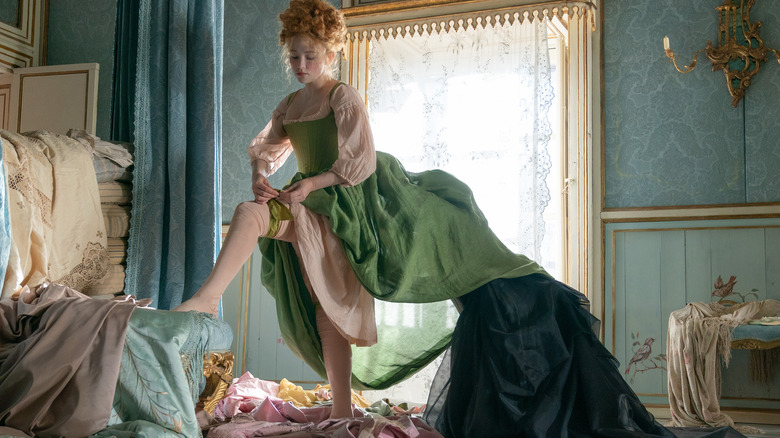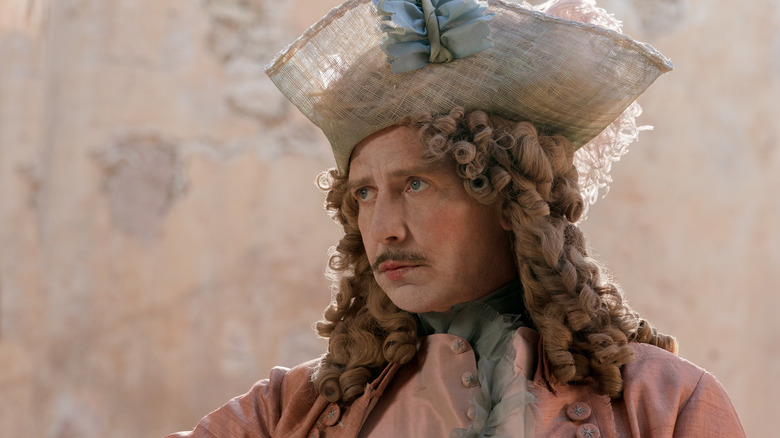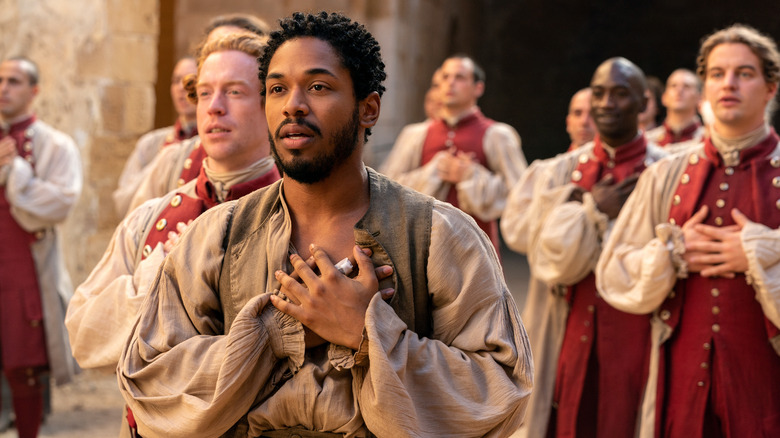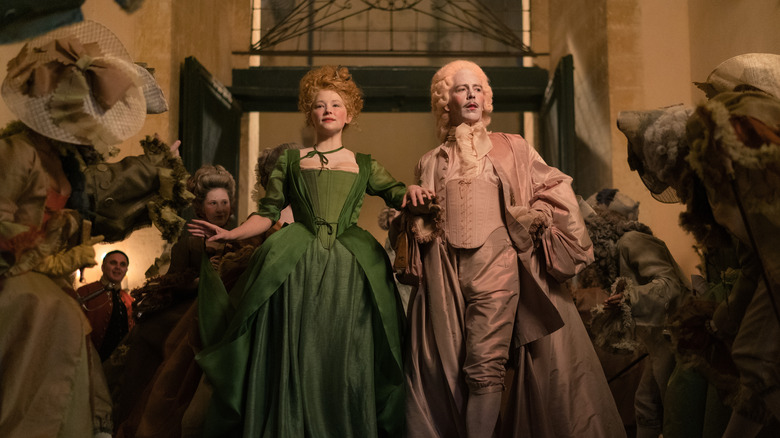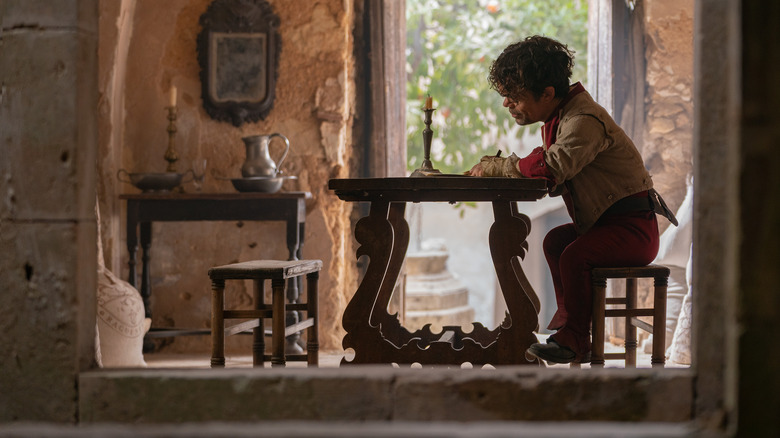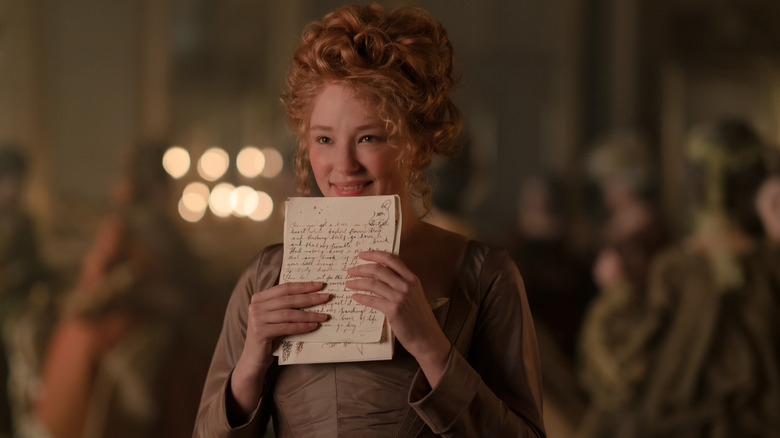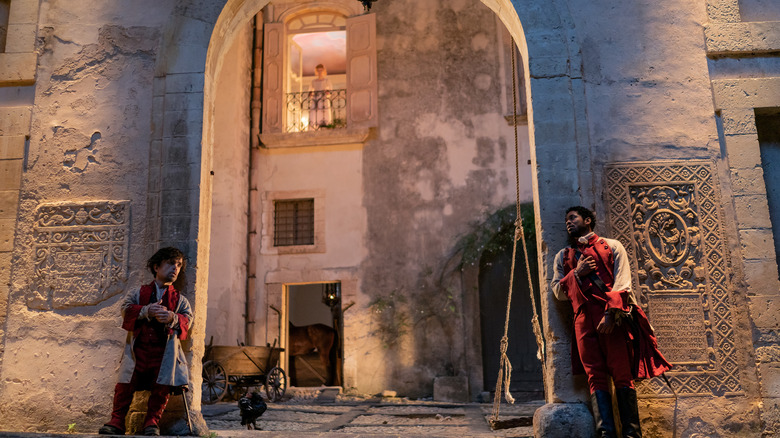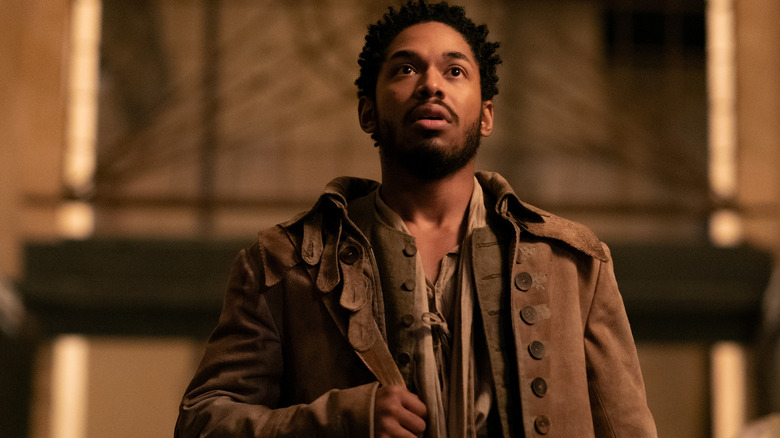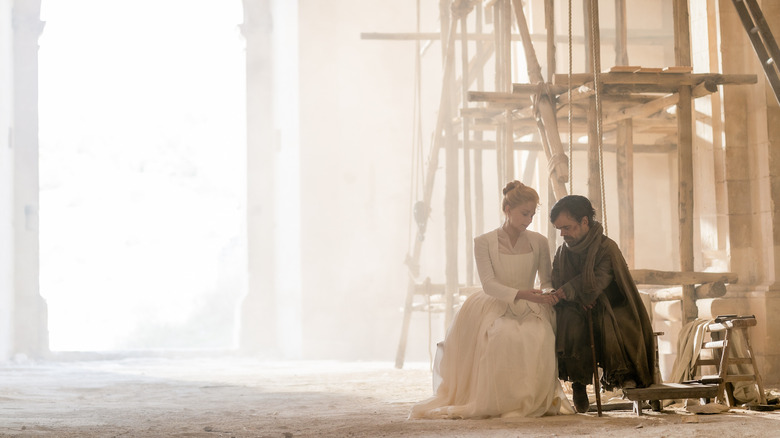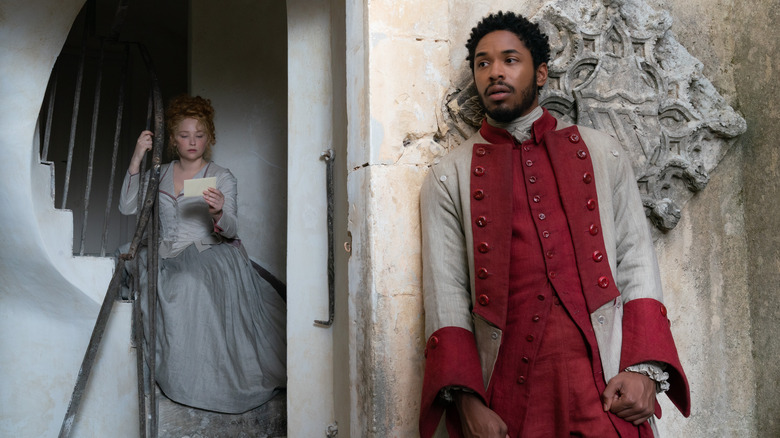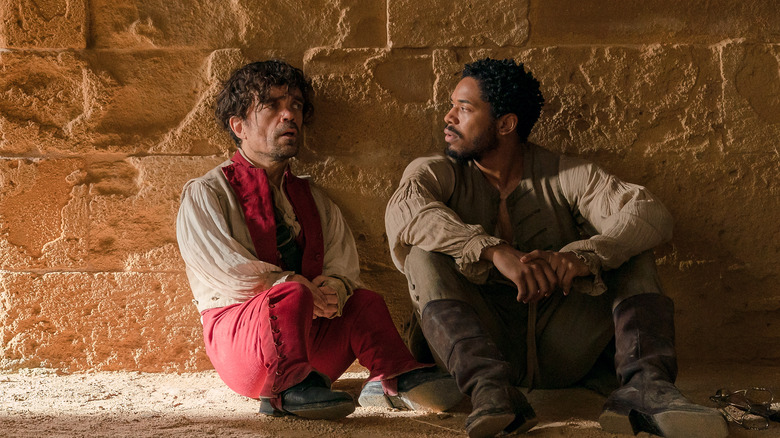The Songs In Joe Wright's Cyrano Ranked Worst To Best
If you were awed by Joe Wright's adaptation of "Anna Karenina," which fuses sumptuous stage artifice with naturalism, you may be curious to see how Wright brings stage musicals to the screen. If so, you need to watch "Cyrano."
Edmond Rostand's 1897 play "Cyrano de Bergerac" has been turned into a musical a few times before; the 2019 version, written and directed by Erica Schmidt with music by The National, is just the latest attempt. Still, the plot remains the same: So lovestruck that he's unable to sputter his verses to his childhood friend Roxanne, the poet Cyrano takes advantage of a unique opportunity when Roxanne falls for a handsome soldier named Christian. Cyrano lets Christian use Cyrano's own words to woo the poetry-loving Roxanne, while poor Cyrano pines from a distance.
For the movie adaptation, Peter Dinklage and Haley Bennett reprise the roles of Cyrano and Roxanne, which they originated on stage in Connecticut, while Kelvin Harrison Jr. joins the cast as Christian. Wright, who filmed the production in Sicily, brings a healthy dose of MGM-style romanticism to the proceedings.
In addition to the film, this writer has also seen the original off-Broadway production, which starred Dinklage, at New York's Daryl Roth Theatre. Our ranking of each song will consider the lyrical movements, Wright's visual flourishes, and whether or not the film does justice to the musical numbers as they were presented on stage.
12. Madly
If you've seen the stage production that "Cyrano" is based on, you're likely familiar with the criticisms of Dinklage's untrained singing voice and The National's lyrics; critics noted that much of Rostand's original poetry was watered down in the adaptation. Many of those shortcomings carry over to the film, and Dinklage's second number, "Madly," exemplifies the show's many speed bumps.
Flexing the least amount of musical muscle of any of the film's songs, "Madly" starts and stops with banal words that are more worthy of a forgettable pop ballad. You may be inclined to forgive the song's inertness, since they're sung by a Cyrano who is exhausted from a duel. However, his wit and his affection for Roxanne are most apparent when he speaks, not when he sings. At one point, Cyrano croons, "I know every detail of her / I made a list." Alas, if you're waiting for that list — and some accompanying flourishes of wordplay, metaphor, and floral language — it never arrives.
However, the low-ranking "Madly" proves that Dinklage is anything but unequipped for the role. Dinklage's singing is faultless because, through it, he exposes the imperfections that permeate Cyrano's soul. His earthly rumbles lack any sense of pretension, and drip with laborious sincerity. Dinklage doesn't need to be a polished baritone for his woes to move the audience. In fact, if anything, Dinklage owns Cyrano's imperfections through his voice. Unlike his incendiary tongue in "When I Was Born," "Madly" illustrates Cyrano's low self-esteem when it comes to romance.
11. Someone to Say
You'll be smitten by Bennett's Roxanne at first sight, but you'll fall even deeper in love with her once she dreamily gazes out from the carriage window and begins singing "Someone to Say." The "I Want" song full-heartedly expresses her desire for love, and serves as the first sign of this baroque-set adaptation's modern sensibilities. "Someone to Say" begins as a lovely tune, as if Roxanne had experienced a childhood where she watched the tiny dancers in music boxes as entertainment, an idea reinforced by the sight of two dancers twirling on the street. A chorus echoes Roxanne's desires; the need to be loved is a universal one, after all.
"Someone to Say" sets multiple themes in motion, particularly Roxanne's craving for validating words and reciprocal love, and then builds upon them. "Cyrano" introduces her yearning with a touch of adolescent comprehension. She wonders, "What does it feel like to slow dance in sunlight?" and thinks of love as a ballet. Here, it's important that Roxanne realizes that she wants a poetic love, and that she isn't willing to settle for less. From a distance, Roxanne seems as impressionable as a classic Disney princess, a sheltered maiden who gazes dreamily out the window. However, intimate close-ups on Bennett reveal the contours of her strength and her intellectual yearning.
10. What I Deserve
Through his patriarchal 17th-century lens, De Guiche sees himself as a good guy. On the stage, Ritchie Coster took a self-pitying and confined approach to the character, but Ben Mendelsohn's De Guiche storms to the site of his matrimonial betrayal with unbridled cinematic momentum. "What I Deserve" is the film's only villain song, and the only musical window into De Guiche's psyche. Notably, when it arrives, De Guiche sings not about loving or providing for Roxanne, but about having her. Christian and Cyrano might be imperfect, but they struggle to earn reciprocal affection from Roxanne. De Guiche, by contrast, demands it.
Although he may be an imposing actor, Ben Mendelsohn is not a professional singer. However, his voice does have a thick, growling quality that irradiates a villainous flair. Sometimes, Mendelsohn's voice comes off as strained, over-snarly, or struggling to catch up to the tempo, but his rawness claws at the fabric of hope, leaving it in shreds by the time the following war scenes begin. That said, Mendelsohn's last sustained snarl of indignation when De Guiche discovers Roxanne and Christian's clandestine marriage is cringeworthy and kills the dire mood.
9. Someone to Say Reprise
Christian and Roxanne share a mutual attraction almost immediately, so he must be a real contender for Roxanne's heart, right? Cyrano certainly seems to think so. In this number, a wartime rehearsal becomes a lavish, romantic dance fantasy, as Christian's headspace is filled with waltzing soldiers and gorgeous aerial shots. Quite simply, Christian is looking for love, a sweet someone to acknowledge his worth.
In some ways, the reprise of "Someone to Say" fools both us and Cyrano into believing in Christian and Roxanne's compatibility by letting them share the same melody. Harrison's smoother voice is closer to a traditional Disney prince's than Dinklage's, matching his handsome exterior. The "Someone to Say" reprise doesn't depict Christian as dull, though, but rather as an everyman who simply struggles with words.
"Someone to Say" does a good job fleshing out Christian's well-intended character, his romantic aspirations, and his background as a soldier. The dancing is lovely and sumptuous, though it arguably clashes with the tone of the picture, aiming for grandeur over camera-worthy choreography. That said, the visual clunkiness does more to accentuate Christian's dorkiness than it would if it had been more dynamic.
It is highly informative that Christian thinks in terms of grandiose, corny dance numbers, while Cyrano is more focused on intimate specifics (see, for example, the bare arms covered in flour, pounding dough as baked bread glimmers in the light during "Your Name"). Perhaps when Cyrano catches sight of Christian's exaggerated, if awkward, vision of love, he immediately understands that Christian is fundamentally good at heart.
8. When I Was Born
One of the most famous speeches in the original "Cyrano de Bergerac" is 32 lines of Cyrano deriding his ugly nose, which is traditionally a prosthetic worn by the actors who play him. Schmidt's adaptation is distinctive for getting rid of the nose and casting Dinklage, a man with dwarfism, as the lead. This specific choice makes Cyrano's height, not his nose, the barrier that (supposedly) keeps him from winning Roxanne's affection.
During "When I Was Born," swordplay and wordplay clash as Cyrano dukes it out with a powdered-up French aristocrat. In the midst of this duel, Cyrano lashes out with his tongue at his rival. Capping the exchange off with "God has a sick sense of humor," this sequence reveals how Cyrano feels about himself, and shows how his self-image is shaped by the way that society perceives him. By transforming his self-loathing into elegant poetry, the film sharpens Cyrano's introduction immensely.
What really makes "When I Was Born" thrilling, however, is that it immerses you in Cyrano's confidence in both his combat abilities and his wit, only to surprise you when it turns out that he's shy when it comes to matters of romance. This contrast returns when Cyrano bests 10 men in the dark. But "When I Was Born" is far from a perfect sequence. It has a hurried pace, and it's so busy with the parries and thrusts of its participants' swords that Cyrano's words risk getting lost amid the rapid editing.
Interestingly, this number was present in the original Connecticut production of "Cyrano," but was cut from the New York one. Perhaps it was decided that the chorus distracted the audience from Cyrano, who, along with his self-deprecating pain, should be the one commanding the spotlight.
7. Your Name
"Your Name" glimmers with the glory of a sunrise — it literally begins with lyrics about sunlight. Considering Cyrano's extensive vocabulary, it's important that his first letter-writing song sounds like a first draft about to blossom, accompanied by footage of activity in the kitchen. Both are creative endeavors, and Wright invites the audience to examine Cyrano's process as a careful uniting of words and images that shares the same sensuality as baking.
Every time that you write a first draft, you might be disappointed with the clichés that emerge, but after revisions they might lead you to poignant humdingers: "What am I supposed to say? Words are only glass on a string." "Your Name" is about Cyrano searching his soul to find the right romantic voice. It makes Cyrano's love into a sensual act, a mental waltz, and a feeling that loiters in the imagination and infuses the heart.
The film version of the song successfully recreates the stage musical's dreamy choreography, with the camera gazing on the bare flour-covered flesh of the bakers' arms as they pound and massage the dough. Wright laces it with shots of dancing and fully-baked bread glistening in the sunlight. It's not surprising that this was the piece that Dinklage chose to perform for the public on "The Late Show."
6. I Need More
Roxanne is a relatable, messy maiden who asserts her own worth, even in the 17th century, when she's expected to settle for being married off. It's easy to perceive her as a simple-minded socialite, but Roxanne is always navigating between superficial pleasures and her intellectual needs, and doesn't see romantic aspirations and poetic intellect as mutually exclusive concepts. Disappointed by her first face-to-face conversation with Christian, Roxanne storms off and huffs, "I need more."
"I Need More" is a demand for what Roxanne deserves. She may appreciate the words "I love you," but Roxanne also wants real effort and depth from the man who seeks her affection. To her, the ideal lover knows how to fulfill not just her heart, but also her mind. So, it is no wonder that she pines more for what Christian represented than the actual person. On the streets, she swoons and sighs as she dances and pleads for "waves of desire to come over her."
(As an aside, "Hamilton" star Jasmine Cephas Jones sang an excellent version of this song when she played the role in the off-Broadway production; unfortunately, no recording of Jones' performance exists.)
5. Overcome
In "Overcome," Christian and Cyrano sing a duet while furthering their deception on Roxanne's balcony. True to his promise — "Make me handsome, and I will make you eloquent" — Cyrano is as determined as ever to live vicariously through Christian, thinking he is fulfilling Roxanne's romantic wishes. So, Cyrano feeds Christian his verses, which Christian mimics. Eventually, Cyrano, still concealed, begins speaking directly, and is able to proclaim his love to Roxanne for the first time. Cyrano's words are what Roxanne wants to hear, and she falls for Christian, who she assumes is delivering those messages.
What Cyrano and Roxanne both realize is that they don't always need to use flowery language, and that they can simply speak from the heart; "Words can only get me so far," the song says. "Overcome" is a sad conversation between our leads, a shadowy confession of love that slowly and emotionally unravels. Just watch Dinklage's expression and listen to the tender quaking of his voice as he finally pours out his heart.
4. Close My Eyes
In this aching ballad, Harrison's voice casts a spell over the gray and snowy atmosphere. "Close My Eyes," which opened act 4 of the stage production, sees Christian's life become mired in war and the life of a soldier while Cyrano scrambles to take care of him.
Bundled in longing and despair, the song finds Christian at his most poetic, navigating the heartbreak brought on by lingering romantic memories and the physical distance between him and Roxanne, forming an excruciating limbo between hope and death. The voices of other soldiers support Christian's, echoing his pain, as if unfurling the red carpet for the 11 o'clock number "Wherever I Fall." Like "I Want More," this song is one of the most radio-worthy earworms on the "Cyrano" soundtrack.
3. No Cyrano
A "Cyrano de Bergerac" adaptation that's truly loyal to the source material will not end with a happily ever after. Appropriately, "No Cyrano" throws open the emotional floodgates; this is the movie's big finale, after all. In an intimate close-up, a tortured Cyrano dies admitting that the only thing that he ever held onto was "his pride," which served as the real obstacle between himself and Roxanne. It's a tragic final note for his love, which turns out to not be quite as unrequited as he assumed. Roxanne's knowledge of the ruse also leads to an epiphany of her own, as she realizes that her ideal intellectual and romantic partner existed all along in her childhood friend.
Whether you're thrilled by the lyrics or not (the low point on this list, "Madly," makes a brief return here), "No Cyrano" is a devastating duet held together by Bennet and Dinklage's performances. The childhood friends exchange final words of warmth, affection, and belated realizations in anguished close-ups, finally bridging the one-sided longing established during "Your Name." From then on, the lyrics do not matter much; only the two souls clinging to the last visages of their deep connection are important. As the finale unfolds, the white sun spills in, referencing the lyric "Heaven is wherever I fall."
2. Every Letter
It would be pedestrian to simply film the performers reading letters and singing about their feelings. Thankfully, that doesn't happen here. "Every Letter" is bold, and speaks in the visual poetry of a music video as Roxanne embarks on flights of fancy.
Wright dares to dream of the act of trading letters as a sensual act. When Roxanne reads her first love letter, she flutters, gripping her mattress and brushing the letter on her flesh as if she wants to make love to the imaginary courtier penning the words. Her corset loosened, Roxanne expresses the contemporary desires of a young woman who has consumed a romantic text, imagining herself as one part of the fictional love affair. As it goes on, her dance emboldens the mingling of the intellectual and the romantic in Roxanne's imagination.
1. Wherever I Fall
Love during wartime heightens one's awareness of their mortality, and words of affection often bleed out as Death stands waiting with its arms wide open. On the stage, "Wherever I Fall" was indisputably the musical's 11 o'clock number, with heartbreaking lyrics and a potent marriage between military maneuvers, mood, and gunfire. If you've seen the sequence live, you'll know that it's astounding to watch the fluid choreography as soldiers slide down ramps into foxholes and lift their rifles, singing about the letters they sent to their loved ones before their suicide mission.
"Wherever I Fall" is hands-down the strongest song on the "Cyrano" soundtrack. It focuses on three anonymous soldiers (Glen Hansard, Sam Amidon, and Scott Folan) and their various relationships and recollections. There's man who hasn't seen his wife for a long time ("I can see her in every detail now / turning in my mind"), a bumbling confession of love ("Instead, I told her mother"), and a fraught relationship between a son and father ("He's going to Hell"). It's a tapestry of pathos.
Wright is clever to not try and translate the balletic stage movements to the screen. Instead, he favors close-ups and gracious pans over the characters' faces. It's a technique that provides some breathing space for the three figures, giving them room to ruminate on their letters and spill the details about their loved ones and how they feel. It also leads to an effective reveal when the camera eventually pulls back to reveal Cyrano and Christian, bringing them closer to a reckoning over their shared love for Roxanne.
